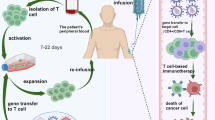Summary
We have used MAb to L3T4 to examine the function of L3T4+ T cells in normal and autoimmune mice. Treatment of mice with MAb to L3T4 profoundly depleted L3T4+ cells from the blood, spleen, and lymph nodes, but not the thymus. In BALB/c and C57BL/6 mice, selective depletion of L3T4+ cells blocked both primary and secondary humoral immune responses and inhibited, but did not prevent, cellular immune responses. In lupus-prone B/W and BXSB mice, depletion of L3T4+ cells significantly retarded autoimmune disease. Because the L3T4 antigen in mice is homologous to the CD4 antigen in humans, these findings have implications regarding the function of CD4+ T cells and the prospects for using MAb to CD4 as therapeutic agents.
Similar content being viewed by others
References
Tam, M.R.; Bernstein, I.D.; Nowinski, R.C.: Alteration of lymphcid cells in AKR mice by treatment with monoclonal antibody against Thy-1 antigen. Transplantation33: 269–273 (1982).
Ledbetter, J.A.; Seaman, W.E.: The Lyt-2, Lyt-3 macromolecules: structural and functional studies. Immunol. Rev.68: 197–218 (1982).
Wofsy, D.; Ledbetter, J.A.; Hendler, P.L.; Seaman, W.E.: Treatment of murine lupus with monoclonal anti-T cell antibody. J. Immun.134: 852–857 (1985).
Ortho Multicenter Transplant Study Group: A randomized clinical trial of OKT3 monoclonal antibody for acute rejection of cadaveric renal transplants. New Engl. J. Med.313: 337–342 (1985).
Dialynas, D.P.; Quan, Z.S.; Wall, K.A.; Pierres, A.; Quintans, J.; Loken, M.R.; Pierres, M.; Fitch, F.W.: Characterization of the murine T cell surface molecule, designated L3T4, identified by monoclonal antibody GK1.5: similarity of L3T4 to the human Leu-3/T4 molecule. J. Immun.131: 2445–2451 (1983).
Cantor, J.; Boyse, E.A.: Functional subclasses of T lymphocytes bearing different Ly antigens. I. The generation of functionally distinct T cell subclasses is a differentiative process independent of antigen. J. exp. Med.141: 1376–1389 (1975).
Ledbetter, J.A.; Rouse, R.V.; Micklem, H.S.; Herzenberg, L.A.: T cell subsets defined by expression of Lyt-1,2,3 and Thy-1 antigens. Two-parameter immunofluorescence and cytotoxicity analysis with monoclonal antibodies modifies current views. J. exp. Med.152: 280–295 (1980).
Dialynas, D.P.; Wilde, D.B.; Marrack, P.; Pierres, A.; Wall, K.A.; Havran, W.; Otten, G.; Loken, M.R.; Pierres, M.; Kappler, J.; Fitch, F.W.: Characterization of the murine antigenic determinant, designated L3T4a, recognized by monoclonal antibody GK1.5: expression of L3T4a by functional T cell clones appears to correlate primarily with class II MHC antigen-reactivity. Immunol. Rev.74: 29–56 (1983).
Wilde, D.B.; Marrack, P.; Kappler, J.; Dialynas, D.; Fitch, F.W.: Evidence implicating L3T4 in class II MHC antigen reactivity: monoclonal antibody GK1.5 (anti-L3T4a) blocks class II MHC antigen-specific proliferation, release of lymphokines, and binding by cloned murine helper T lymphocyte lines. J. Immun.131: 2178–2183 (1983).
Swain, S.L.: T cell subsets and the recognition of MHC class. Immunol. Rev.74: 129–142 (1983).
Swain, S.L.; Dialynas, D.P.; Fitch, F.W.; English, M.: Monoclonal antibody to L3T4 blocks the function of T cells specific for class 2 major histocompatibility complex antigens. J. Immun.132: 1118–1123 (1984).
Greenstein, J.L.; Kappler, J.; Marrack, P.; Burakoff, S.J.: The role of L3T4 in recognition of Ia by a cytotoxic, H-2Dd-specific T cell hybridoma. J. exp. Med.159: 1213–1224 (1984).
Swain, S.L.: Significance of Lyt phenotypes: Lyt-2 antibodies block activities of T cells that recognize class I major histocompatibility complex antigens regardless of their function. Proc. natn. Acad. Sci. USA78: 7101–7105 (1981).
Wassner, P.J.; Chan, C.; Lögdberg, L.; Shevach, E.M.: Role of the L3T4-antigen in T cell activation. J. Immun.135: 2237–2242 (1985).
Wofsy, D.; Mayes, D.C.; Woodcock, J.; Seaman, W.E.: Inhibition of humoral immunity in vivo by monoclonal antibody to L3T4: studies with soluble antigens in intact mice. J. Immun.135: 1698–1701 (1985).
Kipps, T.J.; Parham, P.; Punt, J.; Herzenberg, L.A.: Importance of immunoglobulin isotype in human antibody-dependent, cell-mediated cytotoxicity directed by murine monoclonal antibodies. J. exp. Med.161: 1–17 (1985).
Cobbold, S.P.; Jayasuriya, A.; Nash, A.; Prospero, T.D.; Waldman, H.: Therapy with monoclonal antibodies by elimination of T-cell subsets in vivo. Nature312: 548–551 (1984).
Coulie, P.G.; Coutelier, J-P.; Uyhenhove, C.; Lambote, P.; Snick, J.V.: In vivo suppression of T-dependent antibody responses by treatment with a monoclonal anti-L3T4 antibody. Eur. J. Immunol.15: 638–640 (1985).
Benjamin, R.J.; Waldmann, H.: Induction of tolerance by monoclonal antibody therapy. Nature320: 449–451 (1986).
Gutstein, N.L.; Seaman, W.E; Scott, J.H.; Wofsy, D.: Induction of immune tolerance by administration of monoclonal antibody to L3T4. J. Immun. (in press, 1986).
Wofsy, D.; Seaman, W.E.: Successful treatment of autoimmunity in NZB/NZW F1 mice with monoclonal antibody to L3T4. J. exp. Med.161: 378–391 (1985).
Woodcock, J.; Wofsy, D.; Eriksson, E.; Scott, J.H.; Seaman, W.E.; Rejection of skin grafts and generation of cytotoxic T cells by micdepleted of L3T4+ cells. Transplantation (in press, 1986).
Holáň, V.; Hašek, M.: Prolonged or permanent survival of skin allografts induced by monoclonal antibodies against lymphocyte subpopulations. Folia biol., Praha31: 50–58 (1985).
Sprent, J.; Schaefer, M.: Properties of purified T cell subsets. I. In vitro responses to class I vs. class II H-2 alloantigens. J. exp. Med.162: 2068–2088 (1985).
Steinberg, A.D.; Raveche, E.S.; Laskin, C.A.; Smith, H.R.; Santoro, T.; Miller, M.L.; Plotz, P.H.: Systemic lupus erythematosus: insights from animal models. Ann. intern. Med.100: 714–727 (1984).
Wofsy, D.: Administration of monoclonal anti-T cell antibodies retards murine lupus in BXSB mice. J. Immun. (in press, 1986).
Wofsy, D.; Seaman, W.E.: Antibody to the helper T cell antigen, L3T4, retards advanced lupus in NZB/NZW mice. Clin. Res.34: 110A. (1986).
Waldor, M.K.; Sriram, S.; Hardy, R.; Herzenberg, L.A.; Herzenberg, L.A.; Lanier, L.; Lim, M.; Steinman, L.: Reversal of experimental allergic encephalomyelitis with monoclonal antibody to a T-cell subset marker. Science227: 415–417 (1985).
Ranges, G.E.; Sriram, S.; Cooper, S.M.: Prevention of type II collagen-induced arthritis by in vivo treatment with anti-L3T4. J. exp. Med.162: 1105–1110 (1985).
Author information
Authors and Affiliations
Rights and permissions
About this article
Cite this article
Wofsy, D., Seaman, W.E. Analysis of the function of L3T4+ T cells by in vivo treatment with monoclonal antibody to L3T4. Immunol Res 5, 97–105 (1986). https://doi.org/10.1007/BF02917584
Issue Date:
DOI: https://doi.org/10.1007/BF02917584




